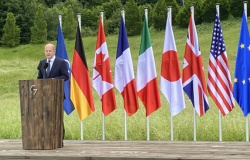Another Summit Over: What has the G7 Ever Done for Us?

International Media Centre, G7 Schloß Elmau Summit
So, another summit has concluded with the release of the G7 Leaders’ Communiqué and the resultant flurry of activity in the International Media Centre (IMC) as journalists are bussed up and down the mountain to attend final press conferences, get to watch presidential motorcades fly past them down the mountain, and seek to digest the document and parse the word salad of summit statements. For what it is worth, here is our attempt.
Ukraine
Ukraine was the issue that partly derailed the original agenda of Germany’s G7 presidency. Expectations ran in two directions. First, focused on the G7, to what extent would its members stand together and present a united front; second, focused on Ukraine, what kind of support would it be provided with, whether that be rhetorical or material.
The response from the G7 leaders has been to state that they will support Ukraine ‘as long as it takes’ and that the G7 ‘will not rest’ until Russia ends its war on Ukraine. So, unity of purpose and unity of words have remained the mantra over Ukraine. The G7 issued a separate statement condemning the Russian bombing of a shopping mall in Kremenchuck that coincided with the G7 leaders meeting, dubbing it a war crime and promising to hold Putin to account. This reinforces the G7’s wider calls that Russia cannot be admitted to a civilised system of states when it breaches such norms and values in targeting civilians and undermines the principles of state-based sovereignty through war.
To this end, the G7 leaders have mandated an expansion of the pre-existing economic sanctions, an expansion that further targets the Russian exports of oil and coal, but also seeks to include Russian gold. In terms of financial support, the G7 leaders pledged to provide up to US$29.5, in addition to the US$60 billion they have provided between 2014 and 2021. Acquiescence and obedience to the principles and norms of international law are of crucial importance in the G7’s statements and actions. Whether that be the imposition or expansion of economic sanctions, or the resolute words that imply the rising challenge to a liberal international order, the G7 leaders are adamant that the actions they take are within the rules and norms of international law and international values, and they take said actions to protect those laws and values from the direct challenge posed by Russian aggression.
What has perhaps been most interesting in the discussions, photoshoots and press conferences at this summit is the absence of the pre-summit narrative that the host Germany was doing too little to support Ukraine, foot-dragging in its commitments, or supporting divergent diplomatic narratives reminiscent of the 2015 Schloß Elmau Summit held in the same mountains where the thinking of Russland-Versteher, or ‘Russian-Understanders’, held a dominant narrative in the response to the first invasion of Ukraine in 2014. There has been little sight of any Putin-Versteher (Putin Understanders) in this summit’s discourse with the German Chancellor Olaf Scholz reinforcing the German government’s support for Ukraine as well as the wider recognition of the challenge Russia now poses to European security.
Democracy
On the second day of the summit, the G7 leaders released a statement on resilient democracies. This was echoed and reinforced in the opening to the Leaders’ Communiqué that described the G7 as ‘open democracies adhering to the rule of law … driven by shared values and bound by our commitment to the rules-based multilateral order and to universal human rights’. This harks back to the original G7’s Rambouillet Declaration of 1975 that stressed their position as governments of ‘open, democratic societies, dedicated to individual liberty and social advancement’. This was important then and thereafter as it provided the defining membership criteria of an informal grouping. It is important now as the G7 continues to define itself as a group of democracies distinct from larger and more diverse groups like the G20, while expanding its partnerships with other democracies, specifically Argentina, India, Indonesia, Senegal and South Africa who were invited to this summit, in addressing global challenges and upholding the rules-based international order. This updates and reinforces last year’s Open Societies Statement made by the G7 at Carbis Bay in light of Russia’s invasion of Ukraine.
Infrastructure
Economic development is closely connected with democratic resilience and this is recognised in the G7 leaders’ announcement on the first day of the summit of the relaunch of the Partnership for Global Infrastructure and Investment that was announced at last year’s G7 in Cornwall. This initiative will aim to raise US$600 billion over the next five years to support high-quality and transparent infrastructure projects as part of a holistic approach that mainstreams environment and gender concerns. However, this initiative is not solely about the specific and admirable examples of projects namechecked in the leaders’ joint press conference. The terms ‘high quality’ and ‘transparent’ are usually thinly veiled criticisms of China’s Belt and Road Initiative, which this partnership stands in direct contrast to. The extent to which this partnership can compete with and provide an alternative to Chinese investment, or whether the G7 countries are too late to the game, remains to be seen.
Food security
The increasingly dire food shortages that are spreading globally are in part due to the blockade and ongoing conflict in Ukraine. The resultant lack of export of key grains from silos in and around the Ukrainian port of Odessa is having serious ramifications for grain-importing countries such as Somalia, Yemen, Lebanon and the wider world. Rather outlandish media commentary during the summit regarding the need for G7 and NATO leaders to implement a naval corridor to export said grains overlooks not only the real risk of military escalation in doing so but also the agency and interests of Ukraine itself. Ukrainian mining of the waters around the port of Odessa was deliberate and remains a key asset in preventing the port being attacked by Russian forces. To acquiesce in the removal of such protections without the agreement of a NATO-backed effort to protect the port, along with serious questions surrounding the willingness of both merchant marine and NATO forces to enact said convoys, means that the G7 leaders needed to look for alternative solutions that work within the parameters of what exists on the ground.
A unified front on any solution to this crisis would have been a particularly important outcome to include in the summit’s communiqué, especially in terms of the potential impetus it could provide as the leaders fly off to the NATO Summit in Madrid. Alas, little concrete action was clearly agreed in the formal communiqué, leaving the summit lacking a positive position to take to the next meeting when dealing with an intractable military and political ally.
Turkey, one of the key regional members of NATO, but not of the G7, is actively facilitating the purchase and transit of Russian-labelled grain that the BBC has evidenced as actually originating from Ukraine. If the G7 cannot find a solution to the export of Ukrainian grain, then continuing to rely upon the murky diplomatic negotiations between Turkey and Russia over opening up transit routes in the Black Sea will continue to be based on a fallacy that those parties have a serious interest in facilitating such an outcome. As long as regional players continue to access and export the raw materials in line with their national interest, the only players in town that can make a difference are those who are sat around the G7 table, in particular the Presidents of the EU Council and Commission. Facilitation of land transportation at scale can be coordinated if the key states and key actors are serious about rectifying this global food insecurity problem. Alas, more bland words and vague promises in the communiqué are not the direct action required.
Inflation
This year’s summit comes at a time when many are referring back to the 1970s for the last time developed economies saw inflation at such high levels combined with anaemic growth and the real risk of stagflation. Ironically or not, the G7’s origins lie in the need for a coordinated global policy response to high inflation and low economic growth combined with spiking oil and energy prices caused by the 1973 OPEC oil crisis. However, the G7 today represents a forum of developed economies that no longer hold such a dominant sway in a globalised international economy as they once did. The implications for global oil prices of EU sanctions, the reluctance of leading OPEC producers to open the taps once more to bring down prices, and the rejection by domestic US shale oil producers to re-invest or ramp up production rather than suck in high profits for shareholder payments mean that the political levers available to G7 leaders are both dispersed and unlikely to move when pulled upon. The final communiqué reflects this political dilemma facing the G7 leaders with a statement that ‘encourages’ oil producing states to increase production, rather than concrete proposals on how this will occur.
Similarly, the floated idea of an oil price cap earlier in the summit has the potential to be a game-changer in a coordinated response to rampant energy prices. Yet, how this will politically, logistically and practically work when the dominant oil-producing states are not members of the G7 is unclear. Why would the OPEC+ states be willing to accept price caps, which would in turn impact their domestic economic budgets, when it is recipient states, not producers, making the rules?
In fact, as per the G7’s own emphasis in the final communiqué regarding the importance of working within the constraints of international law and the rules-based international order, there seems no available mechanism to enact such a price cap outside of arbitrary imposition by the G7 countries. Likewise, how international private oil-producing companies react to what is in essence a tax on their profits might be similar to the trenchant reaction by North Sea oil companies to the imposition of UK windfall taxes, or the negative reaction of US shale oil companies to President Biden’s past calls for increased drilling.
This G7-led oil cap idea also overlooks the aforementioned issues regarding non-Western and non-G7 member countries. While India’s Prime Minister Narendra Modi may have been an invited guest at Schloß Elmau, the fact that India and China are taking advantage of the glut of Russian oil for sale that exists outside of the international sanctions means that there is already division between G7 members and invited guests. This remains a murky and complicated situation with reports that Indian purchases of Russian oil are in fact simply facilitations of Russian oil reaching parched European markets. This is a political and economic position that may be unlikely to change, particularly when the G7 leaders themselves have to water down their language to include the caveat that further restrictions of Russian oil will be subject to the circumstances of developing states, which is code that sanctions will continue to neither be applied to, nor be adopted by, rising powers such as India.
When factoring in China’s willingness to support Russia as its new-found political and economic ally, and provide an economic lifeline that helps sustain Russia’s military invasion of Ukraine, the G7 is faced with a global superpower that is willing to ignore calls for greater restrictions upon Russia. The result of this is that the G7 recognises its inability to shape the foreign policy of China, and instead kicks issues down the road by using language that describes its future response as being in ‘coordination with the International Energy Agency’. The fact that G7 leaders have little influence over the actions or decisions of a non-member such as China lies at the heart of much of the global logistical bottlenecks and resulting impact upon inflationary prices. The lack of Chinese participation in G7 deliberations means that while G7 leaders may be able to achieve a unified statement, and significant actions to bring down inflation or reduce the impact from supply chain pricing, effects will be limited. In the 1970s the G7 leaders were able to tackle economic difficulties by coordinating some, if not all, economic and political responses. Back then the G7 was emerging from a breakdown in the post-War Bretton Woods system of managing the international economic order. Now, the leaders affirm and support in their communiqué the commitment they have made to the rules-based liberal international economic order that is predicated upon shared values and norms, as well as international institutional laws and frameworks of solving disputes between states within the forum of the World Trade Organisation. In essence, the G7 leaders may not have provided direct policy solutions but they are attempting to send a message to more destabilising global actors that they stand firmly behind the pre-existing structures of international order. What remains to be seen from the discussions at this summit, and the ongoing global economic crisis, is whether forty-eight years later the G7 can still have the same impact that it did in 1975.
Climate Change
Although Ukraine inevitably received most of the attention in the run-up and during the summit, climate change is the genuine existential threat to the world and so was never going to be ignored by the leaders. In fact, it was given top billing in the communiqué. The main take-away was the G7’s commitment to establish ‘an open and cooperative international Climate Club’ by the end of the year that will promote a range of decarbonisation measures with the goals of accelerating the Paris Agreement and limiting global warming to 1.5 degrees Celsius. The Climate Club is a collective of the most ambitious countries in the world when it comes to enacting climate policies. The intention is to appeal to the highest, rather than the lowest, common denominator. The G7 chair’s summary, entitled Joining Forces to Accelerate Clean and Just Transition towards Climate Neutrality, embraced the invited countries of Argentina, India, Indonesia, Senegal and South Africa within these endeavours. All of this was very much in line with the German government’s declared objectives when it assumed the G7 presidency, although doubts have been cast on how effective such a club can be, particularly when the summit host is ramping up the use of coal-fired power stations in response to Russian energy restraints. Despite the visibility given to the issue in the communiqué, the specifics will disappoint many. In particular, the longer-term commitments to phasing out fossil fuels are diluted by the short-term importance placed on the role that liquified natural gas can play. Although couched in caveats, the G7 has sanctioned continued investment in the gas sector as a temporary response to the current crisis.
In summary, and despite what we have tried to do here, beware reading too much either positively or negatively into a single summit document. Rather, this communiqué should be placed in the context of a network of summits - most immediately the NATO Summit in Madrid later this week and looking further ahead to the Indonesian-hosted G20 Summit later this year.
Photo, authors' own: German Chancellor Olaf Scholz gives his concluding press conference on the last day of the G7 summit


